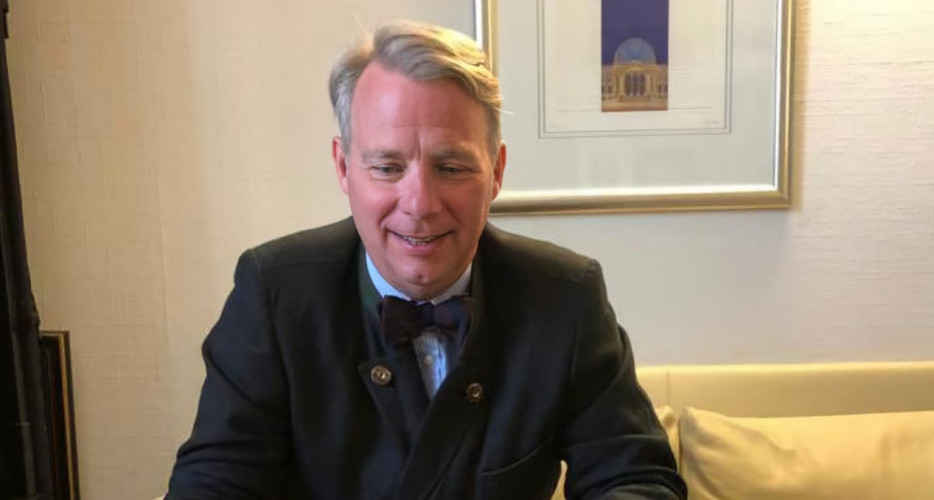
PEREGRAF- Surkew Mohammed, Paria Hushiar
Five journalists and activists arrested last year in Duhok, were convicted in February and given six years jail sentence on charges of "endangering the national security of the Kurdistan Region." Allegations against them included contacting and taking money from the German and American consulates.
The German consulate in Erbil "regrets today's decision by the Court of Cassation against five journalists & activists. The decision remains difficult to comprehend, lacking clear proof of punishable crimes" the consulate tweeted on May 6, calling on the Kurdistan Region’s President "to invoke his power to grant amnesty."
"Our position has not changed," Germany’s Acting Consul-General, Sven Krauspe told PEREGRAF in an interview, where he also talked about the German-Kurdish ties and the Peshmerga reform. Germany and the Kurdistan Region have an "open and frank exchange of their mutual understanding on the various topics and fields of cooperation."
The following is the full interview PEREGRAF conducted with Krauspe on July 13.
What are your expectations for the future of ties between Germany and the Kurdistan Region?
Germany has a close and strong relationship with the Kurdistan Region-Iraq and on this basis we will continue working together, having an open and frank exchange of our mutual understanding on the various topics and fields of cooperation.
What about the German assistance to the Peshmerga forces in combating ISIS.
Indeed it was mainly the Peshmerga who were carrying out the fight against so-called ISIS. Many Peshmerga were giving their lives in this fight. Germany and other countries were trying to support the Peshmerga in their fight against Daesh. There was a strong engagement from the German side, inter alia by supplying military equipment, for example the famous MILAN. But apart from this engagement, Germany was also trying to support the Kurdistan Region-Iraq (KRI) through humanitarian help for internally displaced persons, refugees, the reinforcement of the local infrastructure in KRI and through political, economical and cultural cooperation with the KRI.
How can Germany help or assist the Kurdistan Region to improve its efforts in the reformation process and combating corruption, especially in the ministry of Peshmerga?
The Multinational Advisory Group is supporting the Ministry of Peshmerga Affairs in carrying out a reform plan. At the moment four countries are active in this group: the United States, the United Kingdom, the Netherlands and Germany. These four countries are working together in implementing a reform plan. We are in the middle of this reform process and we will carry on with our activities.
Are you happy with the reformation process you have started in the Ministry of Peshmerga?
It is a process, that means it is not finalized yet. Even though we have already reached certain objectives, it is still a long way to go. Close and constructive cooperation, in particular with the Ministry of Peshmerga Affairs, and the political reform will are essential to implement the reform plan.
From what you have understood so far, do you think the Patriotic Union of Kurdistan (PUK) and the Kurdistan Democratic Party (KDP) will give their Peshmerga up to become a national force?
This is a crucial part of this reform plan: the integration of the 70 and 80 brigades under the Ministry of Peshmerga Affairs. You have heard that the 80 brigades and also the 70 brigades, made public that they are ready to participate in that regard. I think this is a promising note, but of course the proof of the pudding is in the eating.
Freedom and human rights in the Kurdistan Region, especially the freedom of the press, has been facing a lot of criticism lately because of the arrest of Duhok’s journalists and activists. What is your current statement for the Kurdistan Regional Government (KRG)? and how important is it for the KRG to protect the people’s rights and freedom?
There is no current statement from the Consulate General or from the German side for the KRG (smiling). We are in constant contact with our partners in the KRG on various levels, and you know that we publicly made our position clear and this position has not changed. So for us it is essential that there is an open exchange with the civil society, journalists, activists, which are part and parcel of our daily diplomatic work all over the world. And indeed we are very supportive of making civil society flourishing, an aim that we believe is also shared by the KRG. Freedom of speech and human rights, freedom of expression, media freedom, as well as an independent judiciary are essential components of any democracy.
When the court issued their sentences, their names were mentioned, they issued a strong statement asking the Kurdistan Region’s president to grant a special amnesty. But the latest court decision, their names were not mentioned, they didn't have a statement in public, there was some criticism that they spoke up because of their name. What do you have to say for that criticism?
This might be a misunderstanding. There was an EU statement from the EU Delegation in Baghdad and on behalf of its member states in Iraq. This statement was retweeted i.a. from the German Embassy in Baghdad and the German Consulate General in Erbil, to make our position very clear in that regard.
Do you still have the same stance that the Kurdistan Region’s President should grant them amnesty?
Our position has not changed and is reflected in our tweet dated 6th of May and the subsequent retweet of the recent EU statement.